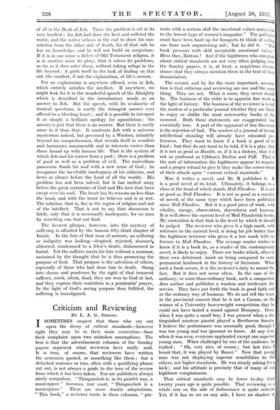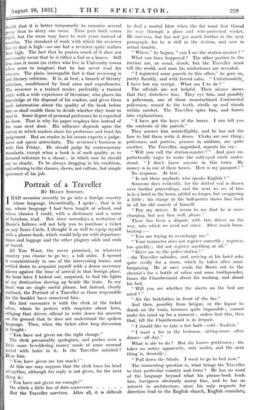Criticism and Reviewing
BY L. A. G. STRONG.
ISOMETIMES suspect that those who cry out upon the decay of critical standards—however right they may be in their main contention—base their complaint upon two mistaken assumptions. The first is that the advertisement columns of the Sunday papers represent what reviewers have really said. It is true, of course, that reviewers have written the sentences quoted, or something like them ; but a detached sentence or two, often with a qualifying phrase cut out, is not always a guide to the tone of the review from which it has been taken. Nor are publishers always nicely scrupulous. " Thingumbob is, in its painful way, a masterpiece " becomes, tout court, " Thingumbob is a masterpiece." There are more drastic adaptations. " This book," a reviewer wrote in these columns, " pre- sents with a certain skill the emotional values acceptable to the lowest type of women's magazine." The publisher must have been hard up for bouquets to think of culling one from such unpromising soil ; but he did it. " This book presents with skill acceptable emotional values:, Bless thee, Bottom ! And if the highbrows who complain about critical standards are not very often judging from the Sunday papers, it is, at least, a suspicious circum. stance that they always mention them in the text of their denunciation.
The second, and by far the more important, assump. tion is that criticism and reviewing are one and the same thing. They are not. What is more, they never should be. The business of the critic is to appraise fine work in the light of history. The business of the reviewer is to tell the readers of a particular journal whether they are likely to enjoy or dislike the most noteworthy books of the moment. Both these statements are exaggerated, but essentially true. A part of the appraisal of fine literature is the rejection of bad. The readers of a journal of decent intellectual standing will already have educated pre. ferences. They want to know if a book is good of its kind ; but they do not want to be told, if it is a play, that it is not as good as Hamlet, or, if it is a history, that it is not as profound as Gibbon's Decline and Fall. That is the sort of information the highbrows appear to require, and a proper refusal to give it they make the corner-stone of their attack upon " current critical standards."
Miss A writes a novel, and Mr. B publishes it. It is a good novel of its kind. Ultimately, it belongs to a class at the head of which stands Moll Flanders. It is not as good as Moll Flanders. It is not as good as a number of novels of the same type which have been published since Moll Flanders. But it is a good piece of work, with vitality, energy, observation, shrewdness and humour. It is well above the current level of Moll Flanderish books. My contention is that that is the level by which it should be judged. The reviewer who gives it a high mark, with reference to the current level, is doing his job better than the highbrow reviewer who gives it a low mark with re- ference to Moll Flanders. The average reader wishes to know if it is a book he, as a reader of the contemporary novel, is likely to enjoy. There are books which, often to their own detriment. insist on being compared to some permanent landmark in the history of literature. When such a book occurs, it is the reviewer's duty to record the fact. But it does not occur often. In the case of the ordinary, or more-than-ordinary book, such a comparison does author and publisher a wanton and irrelevant dis- service. They have put forth the book in good faith and in the ordinary way of business. We do not tell the tenor in the provincial concert that he is not a Caruso, or the winner of a University heavyweight competition that he could not have lasted a round against Dempsey. Once, when I was quite a small boy, I was present when a dis- tinguished amateur pianist played a Beethoven Sonata. I believe the performance was unusually good, though I was too young and too ignorant to know. At any rate, when it was over, everyone applauded except one superior young man. When challenged by one of the audience, he replied : " Oh, very nice, of course ; but last time I heard that, it was played by Bauer." Now that young man was not displaying superior sensibilities to the others, nor higher standards. He was simply asking for a kick ; and his attitude is precisely that of many of our highbrow complainants.
That critical standards may be lower to-day than twenty years ago is quite possible. That reviewing as a whole errs on the side of forbearance is quite certain. Yet, if it has to err on any side, I have no shadow of doubt that it is better temporarily to canonize several geese than to decry one swan. Time puts both errors right, but the swan may have to wait years instead of months. The standard of work with which the reviewer has to deal is high—no one but a reviewer quite realizes how high. The fact that he praises much of it does not necessarily mean that he is either a fool or a knave. Still less does it mean (as critics who live in University towns often seem to imagine) that he has never read his classics. The plain, inescapable fact is that reviewing is not literary criticism. It is, at best, a branch of literary criticism, conditioned by local aims and expediencies. The reviewer is a trained reader, preferably a trained critic with a wide experience of literature, who places his knowledge at the disposal of his readers, and gives them such information about the quality of the book before him as shall enable them to decide whether they want to read it. Some degree of personal preference he is expected to show. That is why his paper employs him instead of the man next door. His influence depends upon the extent to which readers share his preference and trust his judgement. But no reader in his senses expects a judge- ment sub specie aeternitatis. The reviewer's business is with this Friday. He should judge by contemporary standards, except when a book is of such quality as to demand reference to a classic ; in which case he should say so clearly. To be always dragging in his erudition, and referring to the classics, shows, not culture, but simple ignorance of his job.































 Previous page
Previous page